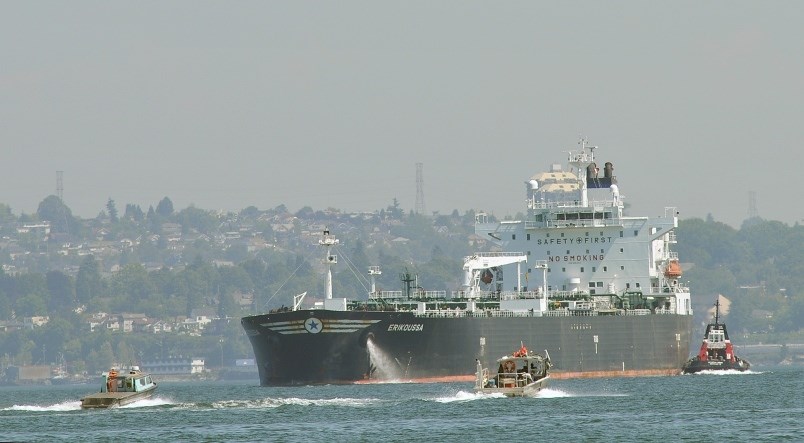Prime Minister Justin Trudeau announced Tuesday that the federal cabinet has approved Kinder Morgan’s Trans Mountain 987-kilometre pipeline project to be built from Alberta to Burnaby, despite widespread criticism from Mayor Gregor Robertson and the Tsleil-Waututh First Nation.
Calling it “a major win” for Canadian workers and families -- specifically for out-of-work Albertans -- Trudeau told reporters in Ottawa the $6.8-billion project is in the best interest of the country’s economy, acknowledging however that he expected pushback from people concerned about oil spills and the continued dependence on fossil fuels.
“If I thought this project was unsafe for the B.C. coast, I would reject it,” said Trudeau, noting the cabinet’s decision hinges on Kinder Morgan meeting or exceeding all 157 conditions set out by the National Energy Board in May. More than 50 conditions are related to the environment and 53 involve engineering and safety. “This is a decision based on rigorous debate on science and on evidence. We have not been and will not be swayed by political arguments, be they local, regional or national.”
Trudeau said the federal cabinet could not have approved Kinder Morgan's project without the leadership of Alberta Premier Rachel Notley and her province's climate plan, which commits to pricing carbon and capping emissions at 100 megatonnes per year. The prime minister said Alberta's plan is celebrated by the energy industry and environmentalists. He said the pipeline project will create 15,000 construction jobs.
Robertson, whose politics for the most part align closely with Trudeau's, has been an ardent critic of Kinder Morgan’s plan, which will almost triple the number of barrels of oil shipped per day from 300,000 to 890,000 and translate to a seven-fold increase in tanker traffic in and around Vancouver waters.
The mayor released a statement following Trudeau’s decision, saying he was “profoundly disappointed” and that approving a heavy oil pipeline expansion was “a big step backwards” for Canada’s environment and economy.
“This project was approved under a flawed and biased Harper-era regulatory process that shut out local voices and ignored climate change and First Nations concerns,” Robertson said. “The federal government’s decision on Kinder Morgan is a missed opportunity for Canada, as there’s never been a better time to aggressively shift to a clean energy future.”
The mayor pointed out Vancouver’s economy created 94,000 jobs last year and significant tax revenue for Canada.
“It doesn’t make sense to jeopardize that success with the risk that comes with an expanded Kinder Morgan heavy oil pipeline and more tankers,” he said. “As I’ve said repeatedly, it is not worth the risk.”
The decision came the day after Chief Maureen Thomas of the Tsleil-Waututh Nation, whose traditional territory includes parts of the North Shore and Burrard Inlet, was in Ottawa to tell reporters how approval of the pipeline project would “reopen many old wounds.”
“Quite frankly,” the chief said in a statement, “such action will irreparably harm our relationship for some time to come possibly for generations.”
The decision to support Kinder Morgan’s project goes against opposition from 17 B.C. First Nations and 20 municipalities, including Burnaby, representing more than two million people. The provincial government said Tuesday it stands by its five conditions for any new or expanded heavy oil pipeline expansion.
Those conditions are:
- Successful completion of the provincial government's environmental review process
- “World-leading” marine oil spill response, prevention and recovery systems for B.C.’s coastline and ocean.
- “World-leading” practices for land oil spill prevention, response and recovery systems.
- Ensuring legal requirements regarding Aboriginal and treaty right addressed.
- That B.C. receives “a fair share” of the fiscal and economic benefits of the project.
Ian Anderson, the president of Kinder Morgan Canada, called the federal cabinet’s decision “a defining moment for our project and Canada’s energy industry.” In a statement Tuesday, Anderson said the project will mean $46.7 billion in taxes and royalties for governments, more than 800,000 person years of employment over the life of the project and allow producers to capture an additional $73.5-billion in revenues.
Anderson said Kinder Morgan was committed to meeting the National Energy Board’s 157 conditions and expected to begin construction in September 2017. The pipeline, which will run along or near an existing pipeline built in 1953, is expected to be operational by late 2019, although court challenges by environmentalists and First Nations could set that date back or potentially halt expansion.
mhowell@vancourier.com
@Howellings



